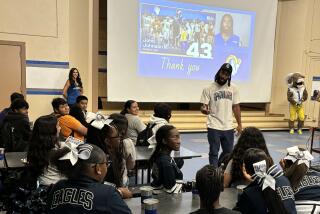Still Going ‘Round and ‘Round Over Whether Earth Is Flat
The man is right. The Earth is flat.
This corner of the Earth anyway--a moonscape of scrubby desert and gnarly trees that has just sprung up rather disconcertingly around my quasi-antique Toyota. The man who gave me the directions said he lived in Lancaster, which, to my understanding, has the requisite number of fast-food joints to qualify as civilization and its discontents.
But this place is to beautiful downtown Lancaster as the Solomon Islands are to the Continent. Many miles east on Avenue J, we are adrift from the mainland here where the center does not hold and simple premises fall apart--everyday assumptions like the Earth is round.
It is round. Isn’t it?
“Everyone in their right mind, unless you’ve been hypnotized, can see that that is a totally absurd notion,” sniffs Charles K. Johnson, major-domo of the rather select Flat Earth Society, which claims 3,500 adherents. “To go anywhere, you’ve got to go over the edge and the water’s all hanging there? I mean, it’s just too silly for words.”
We are lounging in the parlor of Johnson’s house-like structure in the dusty middle of nowhere, which turns out to be quite a bit more in tune with the Flat Earth Society’s esprit than the generic condo-land I’d been looking for. Johnson and his wife, Margie, have been happily living the frontier life for a smidgen more than 20 years.
Their decor is early burners ‘n’ bookshelves, teeming with such classics as Abbie Hoffman’s “Steal This Book” and “Eat Away Illness.” At 3 p.m., a wall clock chimes “Mary Had a Little Lamb.” Outside, there’s a water tank and generator that could be handy in, say, an apocalypse.
“We have a phone, of course,” says Johnson, 68, who looks like a cross between Marcus Welby and Ernest Hemingway.
So much for Johnson’s concessions to convention. He pooh-poohs the common view that Christopher Columbus will earn his quincentennial stripes tomorrow in part for demonstrating that the Earth is round. Not that Johnson holds any grudges, mind you.
“Fine chap, fine chap,” says the retired aircraft mechanic. “He’s a great flat-Earther and his proof will stand forever. . . .
“They told him, ‘You can’t sail out into the sea, by God, you’d go right over the edge.’ . . . But he said, ‘Don’t worry about it.’ . . . After a few days, they saw they didn’t. There was no edge. There’s no globe. The edge is associated with the globe.”
Johnson’s Earth is an infinite plane, a pizza-shaped pie of continents and oceans surrounded by a barrier of ice. Over this flat world without end, the sun whirs around in a circular path.
“Where we’re living is under the sun,” Johnson says. “This is all melted. Directly under the sun, it’s really melted and they’re raising bananas. You go the other way, it’s colder.”
So why does a plane that shoots off in one direction end up where it started?
“You’re going by a compass. . . . You’re sailing around the magnetic north. It takes you around it.”
So how come you can’t fall off?
“If it were a globe, you might wonder. Let’s take a look at that globe. My wife was born in Australia. You’ll have to ask her, ‘Did you ever hang by your feet when you were in Australia? How was it?’ ”
How about gravity?
“It’s like some weird religious doctrine that you can’t explain. . . .”
And Pythagoras, the Greek philosopher who posited a global world in the 6th Century BC?
“Yeah, what about him? They were Greek con men.”
And the space program?
“Now you’re talking about the entertainment world.”
But why fake it?
“Khrushchev made them do it. . . . He started the Sputnik and he claimed we orbited the world, therefore he proved the world is a globe. Over here, Kennedy said, ‘He orbited the world, we’ll go to the moon, we’ll really work this thing out.’ So the game started.”
But what about the other planets?
“Say, ‘planets.’ Don’t say, ‘Other planets.’ . . . The Earth is not a planet. Say you come into any room and you look up and you see a light bulb, and it’s round: ‘Oh, I know the floor is a bulb and it’s round because lookie there, that’s round.’ So why would you look up outside and say, ‘There’s the moon, it’s round, so I know the world is round’? You see how silly that is? How completely illogical?”
Johnson calls education to the contrary “compulsory programming. . . . You’ve been shown globes and the propaganda to such an extent that you’re permeated with it.” He somehow sidestepped being permeated himself, ever since his boyhood in San Angelo, Tex.
When Johnson was 8, he would gaze at a big lake near his home that was several miles across--each one of them flat. “Obviously water’s flat, isn’t it? They’re trying to tell you this water’s bent.” He hoots.
But why, I ask Johnson finally, would anyone bother pretending the Earth was a globe?
“If you can be got to accept this insane idea contrary to all your senses and all your common sense--and it can only be put in a person’s mind when they’re small, when their brain is about the size of a good-size peanut--I mean to really put it in there good, then you’ll believe anything. You have rejected reason and are going by faith, so you can be told anything.”
Except for a couple of choice conspiracy theories going around these days, that sort of thing doesn’t hold much sway with the madding crowds. And Johnson’s road--he’s headed the 104-year-old organization since 1971--is a lonely one indeed.
Even Johnson’s kindred spirits communicate with him by mail, forking over their $10 for an annual membership that includes a subscription to the Flat Earth News. Johnson’s chatty quarterly recaps his world view, punctuated with poetry bits--”Why God Made Little Girls”--and reports on his speaking engagements before Rotarians and the like: “I layed (sic) it on ‘em heavy and they took it like MEN.”
But significantly, Johnson never publishes names of fellow travelers in letters to the editor.
“People who know the Earth is flat don’t go around telling everyone,” he says with some understatement. “I mean, I’m the only one who does that. Why? Because I’m tougher than everybody. Nobody can faze me.”
If flat-Earthers hoe their lonely roads out of reasonable fear of ridicule, you might wonder why a Hollywood filmmaker like Robert Abel would in all seriousness have made a pilgrimage to Lancaster last year to seek out Johnson. Abel was putting together a mega CD-ROM and laser disc project sponsored by IBM that’s now in about 300 schools, grandly titled: “Columbus: Encounter, Discovery and Beyond.” And Abel thought there was a lesson in Johnson’s mission.
But the lesson Abel wanted students to learn had less to do with whether the Earth was round or flat, square or rhomboid. It had to do with Johnson himself.
In a three-hour videotaped interview, what Abel really wanted to know was: Why, in the face of irrefutable evidence to the contrary, did Johnson stick with his wildly unpopular views?
Johnson thought about this for quite a while and then, paraphrasing Socrates, said: “I still keep asking questions. That’s being truly intelligent, to confess you don’t know everything. . . .
“It makes you kind of a loner, you know. Everyone likes to be liked, but you can’t be liked. You have to make up your mind to do without that . . . because people stay away. . . . They don’t want anything to do with a controversial idea.”
So that, in the end, is what Johnson may have to teach the world.
Says Abel: “Obviously, this guy is a nut. But listen to him and listen to his passion. Is he right or wrong? That’s for you to decide. But passion and dedication are some of the greatest attributes a person can have.”
More to Read
Sign up for our Book Club newsletter
Get the latest news, events and more from the Los Angeles Times Book Club, and help us get L.A. reading and talking.
You may occasionally receive promotional content from the Los Angeles Times.






